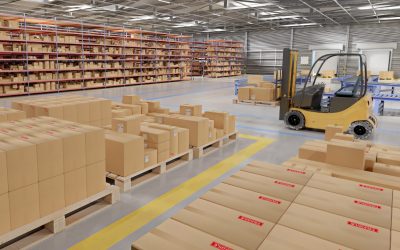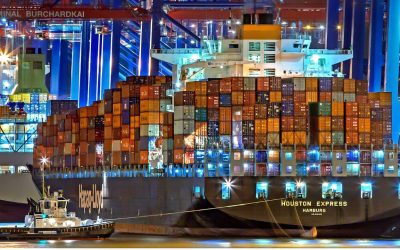A customs broker plays a key role in international trade by facilitating the movement of goods across borders.
Customs brokerage is an essential service in international trade. Its primary function is to facilitate the movement of goods across borders while ensuring compliance with all applicable customs regulations. A customs broker is an intermediary between importers, exporters, and government authorities regulating international trade. These professionals specialize in preparing and submitting the necessary documentation to comply with customs regulations and ensure goods are correctly classified according to the appropriate tariff codes.
Customs brokerage is vital because it simplifies and expedites imports and exports. A customs broker can help reduce delays, minimize the risk of penalties for non-compliance, and ensure that taxes, duties, and other applicable fees are paid correctly. A customs broker also advises businesses on specific trade regulations, import and export restrictions, and international trade agreements.
How a US Customs Broker Helps Businesses Navigate Regulations
The United States Customs and Border Protection (CBP) authorizes and regulates a US customs broker. Their primary responsibility is to act as a liaison between importers and customs authorities, ensuring that goods enter the country in compliance with all applicable regulations.
A US customs broker is responsible for preparing and submitting the necessary documentation for customs clearance. This includes accurately classifying goods according to the Harmonized System (HS) of Codes and calculating and paying duties, taxes, and other relevant fees.
The expertise of US customs brokers in interpreting and applying customs regulations enables businesses to optimize their logistics processes and enhance their competitiveness in the global market. By efficiently managing customs procedures, brokers contribute to the overall efficiency of the supply chain, ensuring that products arrive on time and at a reasonable cost.
The Difference Between an Import Customs Broker and an Export Customs Broker
The difference between import and export customs brokers lies in their roles in international trade. An import customs broker specializes in facilitating the entry of goods into a country, managing the necessary procedures to ensure that products are imported legally and efficiently. On the other hand, an export customs broker focuses on facilitating the exit of goods from a country.
The choice between import and export customs brokers depends on each business’s needs. While the former concentrates on optimizing the import process, the latter is responsible for enhancing export operations. Both functions are essential to ensuring regulatory compliance and operational efficiency in international trade.
Choosing the Right Customs Broker for Your Business
Experience and specialization are key factors when selecting the right customs broker. A broker with expertise in handling the specific products your company imports or exports can provide more accurate and efficient service. Additionally, the broker must hold the necessary licenses and certifications, ensuring their ability to operate legally and competently.
Fee transparency is also essential. It is advisable to request detailed quotes to understand which services are included and avoid unpleasant cost surprises. Moreover, the broker’s technological capabilities should not be overlooked. A reliable customs broker should have advanced systems for managing documentation and tracking shipments.
Another key factor to consider is the broker’s network. A customs broker with a strong network can facilitate processes and resolve issues more quickly, especially in unforeseen situations. Communication skills are equally important, as a good broker should be accessible and provide regular updates on the status of shipments.

What Determines Customs Brokers’ Prices and Customs Brokerage Charges?
The prices and charges of a customs broker can vary depending on several key factors. One of the most decisive aspects is the type and value of the goods being handled. Due to the additional procedures necessary for import or export, high-value products or those requiring special permits and certifications are typically subject to higher fees.
Another key factor is the complexity of the applicable regulations. Industries like pharmaceuticals, food, or technology face more stringent and detailed regulations. Brokers specializing in these sectors often charge higher fees due to their particular knowledge and expertise.
The customs broker’s extra services—such as compliance consulting, inventory management, and integrated logistics services—can also influence the total cost.
The volume and frequency of shipments can positively impact pricing as well. Companies that make frequent and high-volume shipments often secure more competitive rates due to their long-term relationships with the broker. Geographical location also plays an important role, as fees can vary based on the region and the complexity of local regulations.
How Global Customs Brokers Are Facilitating International Trade
Global customs brokers operate across multiple jurisdictions, leveraging their in-depth knowledge of local and international regulations to help businesses expand their markets quickly and securely. These brokers have extensive global networks and strategic alliances, enabling them to manage customs procedures effectively in different countries and continents.
The optimization of routes and transit times is one of the main advantages they offer. Global customs brokers can monitor shipments in real time using advanced technology and choose the fastest and most cost-effective routes. Additionally, their expertise in trade agreements and bilateral treaties allows businesses to take advantage of tariff reductions and tax benefits.

How Customs Brokers Impact Compliance and IOR (Importer of Record)
At Aerodoc, we offer custom clearance as part of our comprehensive logistics services. We handle all necessary procedures to comply with import regulations, including licenses, permits, and certifications the destination country requires.
Unlike logistics companies that merely transport cargo, Aerodoc manages the entire import and export process. This includes accurately classifying products to avoid excessive tax payments and ensure compliance with regulations.
We have deep expertise in handling technological goods, such as telecommunications equipment, servers, data centers, and satellite components. This involves detailed management of tariff classifications and compliance with specific licenses and permits for each product type.
The Aerodoc team constantly communicates with customs professionals and authorities worldwide, ensuring that operations comply with the latest regulations and international standards. This is vital for efficiently managing the customs clearance of technological products in hard-to-reach markets.
Contact our expert team to learn more about how Aerodoc can streamline and optimize your international trade operations.
Q&A
- What Does a Customs Broker Do? A customs broker facilitates the movement of goods across borders by ensuring compliance with customs regulations. It acts as an intermediary between importers, exporters, and government authorities, handling documentation, tariff classification, and payment of duties and taxes.
- How Much Does a Customs Broker Charge? Customs broker fees vary based on the goods’ type and value, the regulations’ complexity, and the additional services provided. High-value products or those requiring special permits may incur higher fees, while frequent or high-volume shippers benefit from competitive rates.
- Is It Worth Getting a Customs Broker? Yes, hiring a customs broker is often worth it for businesses engaged in international trade. Brokers help avoid delays, ensure compliance with regulations, minimize the risk of penalties, and optimize the logistics process, making the supply chain more efficient and cost-effective.
- What Is the Difference Between an Import Customs Broker and an Export Customs Broker? An import customs broker specializes in facilitating the entry of goods into a country, handling necessary documentation and compliance. On the other hand, an export customs broker focuses on managing the exit of goods, ensuring compliance with export regulations and requirements.
- How Can Global Customs Brokers Help Businesses Expand Internationally? Global customs brokers leverage their extensive knowledge of local and international regulations and strategic networks to help businesses expand quickly and securely. They optimize transit routes, manage compliance efficiently, and assist companies in benefiting from trade agreements and tariff reductions.




